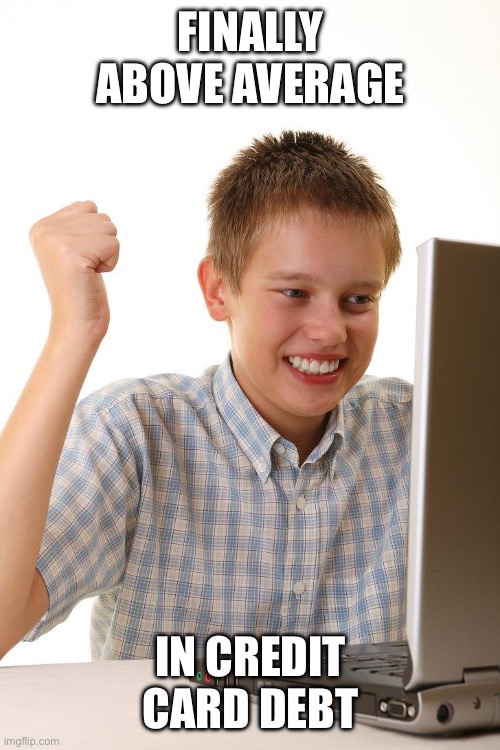Americans now owe $1.13 trillion in credit card debt
https://www.marketplace.org/2024/01/29/why-credit-card-debt-rising-again/
Another reason credit card debt has been rising is because of the strong job market.
That’s because people with jobs feel comfortable spending money on their credit cards, said Liz Ann Sonders, chief investment strategist at Charles Schwab — a Marketplace underwriter.
Hmm. I would have guessed the opposite – that you borrow if forced to in an emergency like a job loss, but if you have income, then you don’t need to take out debt. Apparently that’s not what humans actually do.
Removed by mod
I put my rent on the card if they’d let me for that cash back.
Removed by mod
deleted by creator
There’s a CC that does that. It’s called bilt. I have one and it’s pretty nice but I’m not affiliated. It’s unfortunately set up through one of the shitty banks but I haven’t had any problems with it and I get a nice extra rewards points on rent and Lyft that I wasn’t getting before.
The amount of adults I teach how credit cards actually work is staggering and I’m just a manager. It’s pathetic how little we actually prepare our kids for the real world instead opting to teach them calculus (that most won’t actually need to use).
Fuck taxes and shit they need 2 weeks of Swahili
-Literally my school.
Okay, but also Swahili would be a pretty cool fucking subject. If it’s not helpful at least it should be interesting.
Important things I had to learn on my own in adulthood:
How to research and vet sources.
How to cook and clean.
Amoritization of loans (car and home) and agreements.
Rental agreements and the basics of contract law.
Student loans (the interests rate plus accrual of interest while your are in school).
Taxes - federal, state and local taxes. What their rates are and what they pay for etc…
Insurance (Health, Home, Renters, Car etc.)
Utilities - how they are calculated etc.
Credit cards, interest rates, late payment consequences etc.
Retirement Programs (pensions, IRA, 401K etc.). Investments, how they work, etc.
Basic home repair and remodeling (electrical, plumbing, etc.). Basic car care etc.
We used to call this home economics. Too bad they scrapped it in our public school system. Kids want to learn this stuff too that’s the sad thing.
One of my young coworkers had been running a huge balance on her card for two years. She was making minimum payments every month and didnt understand why the number wasnt going down…
I had to sit her down and explain how interest works and helped her figure out how to take a lower interest loan to wipe out the credit card debt and get a repayment plan going
I wonder what would have happened to her if i didnt overhear her phone conversation and decided to be nosy and ask her about the credit situation…
Doing gods work there. All we can do is our part to help those around us.
Yeah, at least when I went through school, personal finance wasn’t taught.
I think that in fifth grade, we learned to write a check and balance a checkbook. I think that that was the net extent of it that showed up in formal schooling.
In the one home economics class I took, maybe seventh grade, I crocheted a Halloween wreath, but we never actually touched on personal finance. If it was gonna happen, that is where it was going to be covered.
Really came down to what your parents knew and taught you, I suppose.
personal finance wasn’t taught
Pretty sure this is by design… How many other people are in the same boat as my coworker? How many millions are they making off people like her?
Even for myself… I didnt get to the point where i was in her situation, but my own financial literacy wasnt that good just a few years ago… I had no knowledge of investments or anything. My parents raised me to just give all my money to the bank to take care of
Wasnt until i took the time to learn the basics when i realized the bank is NOT your friend. You’ll take 100% of the hit when the economy has a meltdown like 2008, but when you have a massive 10 year bull run and the SP500 goes 4x, you might see half of those gains in the bank mutual fund…
I pulled all my mutual funds and started self directed investing… Way better gains than the bank
Banks are totally profiting off our ignorance and fear of numbers
calculus
I’d say that about the first half of Calculus I was useful to me, taught concepts.
However, a lot of the rest of it, as well as most of the next two calculus classes I took, involved memorizing tricks to do symbolic integration by hand. That is, frankly, of limited use to even people who need to do symbolic integration.
I remember going by my calculus professor’s husband’s (another math professor) office once to deal with some project I was doing and some integration came up and he promptly threw it into Mathematica on his computer to do it. I commented on it and he said “yeah, I don’t have time to spend doing these by hand”.
My smartphone and computers have Maxima installed, a free and open-source computer algebra system capable of doing symbolic integration. I have that with me all the time. It’s very rare that I need to do symbolic integration in the first place.
“But what if you don’t have a calculator with you?”
Today, that’s usually a smartphone, but same idea.
In my parent’s generation, they taught people to manually compute square roots. It was some numerical approximation, don’t know what they did exactly, probably something like “pick a number, divide, average result and divisor, repeat with average”. They didn’t bother to teach that by the time I was going to school. It was just expected that you’d use a calculator.
I remember reading Richard Feynman’s book, about how he used to show off some mental math shortcuts (much more useful in an era before calculators).
I agree that memorizing certain mental math processes can be useful, but the time wasted on doing symbolic integration in calculus is still one of my major annoyances, looking back. There is no shortage of material in mathematics that is useful and could be in the curriculum, and instead we did symbolic integration.
Maybe curriculum has improved since then.
Math education is a disaster. It seems to be thought of as symbolic calculation busywork that’s supposed to translate to a good job somehow. I respected the proofwriting classes a lot more than the number crunching ones
At least when I was in school, one thing that kept getting hammered home was that people had difficulty understanding graphs. That I didn’t see as being an issue, not unless you’re talking about something pretty exotic, but if accurate, it seems like it’d be pretty limiting. And I’ve seen a lot of later articles also saying that a lot of people have trouble with graph comprehension.
googles
https://towardsdatascience.com/numeracy-and-graph-literacy-in-the-united-states-ea2a11251739
Last month, Alessandro Romano, Chiara Sotis, Goran Dominioni, and Sebastián Guidi surveyed 2,000 people to demonstrate that “the public do not understand logarithmic graphs used to portray COVID-19.”
They found that only 41% of participants could correctly answer basic questions about log-scaled graphs (v.s. 84% accuracy for linear-scale).
But the problem is harder than log scales. As you’ll see below, much of “the public” struggle with even the most basic charts and graphs, let alone complex visualizations.
I wish they’d had more statistics. In my high school, they had half a semester as an elective. In my university curriculum, it wasn’t a core class (social science majors would study it, I would guess).
I have explained basic sampling to a ton of people on Reddit when polls came up, because they didn’t believe that a sample of 1000 people out of a much larger population could result in a representative outcome. We see poll data all the time. Even if you never perform a poll, understanding the mechanism at least enough to trust it and understand when a poll might not be representative (e.g. self-selecting Internet polls). Confidence levels. I think I covered regressions in high school in an (elective) physics class, not even in a statistics class. That’s a useful skill – get a bunch of numbers, be able to produce a formula to predict more of them and get an idea of how accurate your model is. I assume that if you didn’t take it or it wasn’t offered, then you just wouldn’t ever touch on them.
Have you looked at math education in the US in the last 15 years? Because it is a lot better than the bullshit they did when I was a kid.
Now kids get an actual understanding and hence intuition about all of it instead of the 1970s approach: “this is the rule, you don’t have to understand it; now, shut up and do it!”
Also, they teach kids about useful shit now like media literacy. In elementary and middle school. And they teach them a bit about economics, jobs, salaries, and budgets.
My kid is a freshman in HS now so I can’t speak to whether they teach about personal finance type stuff but I would be surprised if they don’t given the track record so far.
It’s telling how many parents complained because they can’t understand their third grader’s math homework. Math intuition and understanding should be the main focus at the earlier grades and crap like rote memorization of the times tabs should be dropped. Maybe I’d even teach formal logic and basic proofs in middle/high school (besides just geometry class)
Most people understand the math.
Very few people can delay gratification.
I don’t find that at all. I get the a’ha moment all too often. They literally just were never taught how any of it worked. Takes maybe 5-10 min of telling someone how it works, how the credit score works and how to manipulate it, and how to use credit without letting it get away from them.
Most people understand the math.
Honestly, I don’t know about that.
Exponential growth is really not something that I think is immediately intuitive to people. Like, we can deal with linear things pretty intuitively, but exponential growth is not something that comes pre-baked into our heads.
https://en.wikipedia.org/wiki/Wheat_and_chessboard_problem
The wheat and chessboard problem (sometimes expressed in terms of rice grains) is a mathematical problem expressed in textual form as:
If a chessboard were to have wheat placed upon each square such that one grain were placed on the first square, two on the second, four on the third, and so on (doubling the number of grains on each subsequent square), how many grains of wheat would be on the chessboard at the finish?
The problem may be solved using simple addition. With 64 squares on a chessboard, if the number of grains doubles on successive squares, then the sum of grains on all 64 squares is: 1 + 2 + 4 + 8 + … and so forth for the 64 squares. The total number of grains can be shown to be 2^64−1 or 18,446,744,073,709,551,615 (eighteen quintillion, four hundred forty-six quadrillion, seven hundred forty-four trillion, seventy-three billion, seven hundred nine million, five hundred fifty-one thousand, six hundred and fifteen, over 1.4 trillion metric tons), which is over 2,000 times the annual world production of wheat.[1]
This exercise can be used to demonstrate how quickly exponential sequences grow, as well as to introduce exponents, zero power, capital-sigma notation, and geometric series. Updated for modern times using pennies and a hypothetical question such as “Would you rather have a million dollars or a penny on day one, doubled every day until day 30?”, the formula has been used to explain compound interest. (Doubling would yield over one billion seventy three million pennies, or over 10 million dollars: 230−1=1,073,741,823).[2][3]
The problem appears in different stories about the invention of chess. One of them includes the geometric progression problem. The story is first known to have been recorded in 1256 by Ibn Khallikan.[4] Another version has the inventor of chess (in some tellings Sessa, an ancient Indian Minister) request his ruler give him wheat according to the wheat and chessboard problem. The ruler laughs it off as a meager prize for a brilliant invention, only to have court treasurers report the unexpectedly huge number of wheat grains would outstrip the ruler’s resources.
If it were something that were immediately intuitive, if it didn’t surprise people the first time they run into it, I don’t think it would be such a long-lasting story.
I feel that’s not the same thing as Joe Plumber under standing he pays a 30% charge on the balance of his credit card.
Going as planned. They want customers that carry balances, pay late fees, pay overdraft fees, etc.
I put a lot on parents for not teaching their kids. My kids are going to be prepared and it isn’t because of the school system.
The next paragraph says
That said, credit card delinquency rates have been rising this year, according to the Federal Reserve Bank of New York. That’s especially true among people with lower incomes and multiple types of debt.
From the original article
Meanwhile, households continue to show signs of strain — more cardholders are carrying debt from month to month or falling behind on payments.
(emphasis mine)
https://www.cnbc.com/2023/01/10/americans-lean-heavily-on-credit-cards-amid-inflation.html
Now, 46% of credit cardholders carry debt from month to month, up from 39% last year, according to a new report by Bankrate.
Credit card delinquencies surged more than 50% in 2023 as total consumer debt swelled to $17.5 trillion, the New York Fed reported Tuesday.
Liz Ann Sonders has an interesting theory that doesn’t seem to have any factual basis.
The issue is that people’s cost of living went way up but their salary didn’t so to buy the same amount of food now is like 4 times as much. People end up running out of money before they get paid again because their money doesn’t go very far now and they need to use their credit card to get by for a few days. Keep doing that for a few months and bam 6k in card debt lol.
let’s goooo
it’s a gamble, sure, but i’m waiting until climate change gets bad enough that their server farms get destroyed and our debts with it
The first rule of Project Mayhem is you do not ask questions, sir.
Gee, I guess slamming the brakes on the working man with high interest rates (thank the central bank!) screwed all the working class. And most of us still haven’t had a fucking chance to recover after Covid and war have fucked our finances, and honestly, it’s not like we’re all getting raises.
That’s exactly it. The Federal Reserve is like “this is the only tool we have to control inflation”, meanwhile the fuckheads at our Congress and Senate are like “40% of inflation is solely attributable to corporate profits, but our donors don’t like talking about that sooo”.
Inflation gets reigned in by fucking over the people least able to cope with job loss, insurance cost spikes, etc.
The judicial and legislative branches can get dry fucked by cactus and balsa wood for all I care, almost all of them.
Per card? Or total across multiple cards?
I had a $6,000 bill on one card, paid in full last month, but it was one of those one year 0% interest checks that I had used to pay off a large electrical project.
The rest of my cards have negligible debt. I try to pay off everything every pay day, but I recognize not everyone can do that.
Do you recommend any particular card for 0%? Looking to do a balance transfer.
Discover is the best one I’ve ever had. No annual fee, started out with 0% interest for 18 months. I constantly get 0% balance transfer offers for 12 months, sure it costs a 3% one time fee, but it sure saves money on interest. Plus, their customer service and fraud dispute are the best imo.
It used to be 3% transfer fee, but now it’s 4%, at least for me. I found that the 0% transfer fee with 5.99% APR was cheaper over 12 months when paying it down… especially when paying more in the earlier months.
I used Discover for a balance transfer. However, be sure you do the math. They have options like 0% interest rate with a 4% transfer fee to pay it off in 12 months. I chose instead 0% transfer fee with 5.99% APR over 15 months, but still plan to pay it off in 12 months.
The 4% transfer fee is on the entire balance as soon as you move it over… while the 5.99% interest is on your balance divided by 12 each month… which can get less and less each month depending on how much you pay off.
So for example… $5000 with 0% interest has a 4% transfer fee of $200. But $5000 with no transfer fee has 5.99% interest of around $25 for the first month, and less interest each month if you are paying chunks of your balance down every month. If you are not paying big chunks then the 0% interest with 4% transfer fee may be better.
It really depends on whether or not you plan on paying it off… and how fast you intend to do it. My previous interest was rising to 13% on one card, 19% on another… so 5.99% is much better for me.
Nerdwallet keeps track of whats currently available
Largely depends on the bank, I have 5 different cards that offer 0% balance transfers from time to time.
3 of them are with US Bank, but that might be because I’ve had accounts with them for 30 years. Another with Chase, another with Barclays.
I assume it’s total outstanding debt divided by credit card holder. Kids, never carry a balance on your CC. Do not accept 20% as a reasonable loan. Spend against your budget, save up for big purchases and pay your CC bill in full!

Quiet you! The economy is doing great. Everyone is saying in the news.
Those are rookie numbers.
The concept of credit card sound stupid . Here barely any use them . We use debit card .
Insurance and fraud protection.
That’s what we have with debit cards.
Maybe in your bank. Most banks don’t offer any protection for debit cards. Credit card companies offer more protections and that’s why people use them.
Many do offer protection but during the period between fraud occurring and the resolution, you don’t have access to your money. With credit cards, it’s the banks money that’s missing.
There are a couple benefits to a credit card as long as you are paying them off and not using them when you don’t actually have the money to pay them off.
- It can improve your credit score which is important if you ever plan on buying a house, so you can get a loan.
-There usually aren’t any fees for using the card like most debit cards have (at least where I live).
- many credit cards offer a reward system which you can use to get free stuff, or sometimes just cash back. I have a dividends and get a percentage back on every purchase up to a maximum.
So as long as you pay them off monthly, using a CC instead of debit can actually save you money and be a good thing. It’s when you can’t pay them off, and instead just meet the minimum payments that they become a problem since they have crazy interest rates.
It’s often the other way around in yurop. Debit cards are free or cheap, credit cards aren’t. Credit card scores aren’t a thing. They mainly look at job status, income, savings, family money when considering giving a loan for house purchase. There are credit scores and blacklists, but it’s more a background bank and government thing, not a game in your banking app.
Anyone know how they calculate it? Average of all credit card holders? All US households? Average of all those behind on payments?
$1.13T/$6,360 equals roughly 177 million people. There are 259 million adults in the US, so it must be by card holders.
















